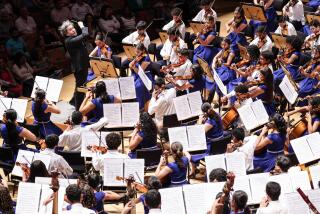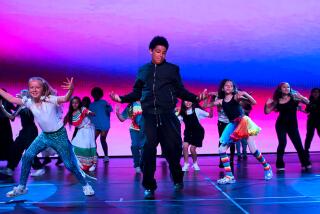High-Tech Piano Class Is Music to Kids’ Ears
With black headphones pulled over his ears, Alfredo Chavez intently prodded an electronic keyboard with his index fingers -- repeating the series of seven notes he’d just heard.
The 5-year-old then watched as an animated Tarzan-like girl on his iMac screen swung from one vine to the next, higher and lower depending on the pitch of the note, before she missed one and fell into the water below.
Alfredo giggled. “I like the sound it makes,” he told his computer teacher.
Alfredo and his kindergarten classmates at Hawaiian Avenue Elementary School in Wilmington began computerized piano instruction in November as part of a pilot program developed by Keys To Achievement Foundation. The nonprofit organization is working to bring one-on-one piano lessons to public school students in low-income neighborhoods.
Hawaiian and Bayside Elementary School in Sausalito, Calif., are the first to implement the program, which was funded through donations.
During two half-hour sessions each week, students from three of Hawaiian’s eight kindergarten classes go through sequenced, self-paced lessons that use colorful graphics and interactive games to teach and reinforce musical and keyboard playing skills. Included are notation reading, rhythm development and ear training. Animated versions of composers, including Beethoven, Bach, Scott Joplin, Fanny Mendelssohn and Heitor Villa-Lobos, guide the students through their lessons.
The lessons are unique in that a software program is the student’s primary teacher, making it an easily replicable and cost-effective music education model. Hawaiian did not hire additional teachers. The class teachers and a computer teacher, all of whom are trained in the software but don’t necessarily have a music background, are present during the class. And the school’s existing computer facilities are used.
But the program is limited in other aspects. Students learn to play on a keyboard rather than a piano, and since a music teacher isn’t present, potential bad habits could develop.
One-on-one piano instruction from a teacher is ideal but costly and time-intensive, said concert pianist David Arden, founder of the San Francisco-based Keys To Achievement.
“It is well-established that for children to be involved at an early age in the arts is critical to their development,” Arden said. “There’s a cognitive, social and creative impact.
“When you walk in the classroom, you see how eager they are to make music,” he said. “You know it’s really reaching deep into them. It’s something that should be part of the school experience.”
California public school students involved in music education courses declined by more than half a million, or 46.5%, between the 1999-2000 and 2003-04 school years, while the overall school population increased by 5.8%, according to a study by the Music for All Foundation, a national music and arts education advocacy group based in New Jersey. Also, the number of music teachers in California declined by about 1,050, or more than 26%, over the same five-year period.
Music for All chairman Bob Morrison cited an increased emphasis on standardized testing in math and reading, as well as budget cuts, as contributing factors. But music programs were cut at a faster rate than other subjects, he said.
As a result, the philanthropic sector has stepped in to provide music and arts education at many schools. For example, the Herb Albert Foundation donated $1.5 million last month to establish arts education for Lawndale Elementary School District’s 5,000 students.
And Little Kids Rock has provided guitars and percussion instruments, as well as music lessons, to more than 4,000 public school students across America since 2001. The nonprofit group founded by former teacher David Wish operates largely through grants, donations and celebrity support.
Still, not everyone likes the idea of computerized piano lessons. Morrison says the idea is an interesting low-cost alternative, but he is concerned that a trained music teacher isn’t overseeing the sessions.
“If the choice is to implement a technology program and not employee a certified teacher in that discipline to oversee that program, I would be hard-pressed to suggest that’s a viable long-term solution,” Morrison said. “Would we allow someone who wasn’t trained in math or science to teach those subjects?”
Maxine Casper, who runs Piano Is for Preschoolers, Too in Laguna Hills, said students probably “will be able to knock out a few tunes. But I would question what kind of quality they would play with and worry about bad habits, such as hand position and posture, to support good playing.”
Arden understands those concerns but said the program was as much about developing musical ability as improving spatial reasoning skills critical to language development and understanding math and science.
UCLA professor James Catterall has studied the effects of music education on young children since 1989 and plans to study the effect of Keys To Achievement on improving students’ musical and mathematical skills during the three-year pilot program.
“It’s not that you’re going to be happy as an adult with stronger spatial reasoning, but ... you have evidence that kids who do better in language arts and mathematics, they’re less likely to drop out of school, less likely to drop out of college, they have access to certain jobs ... that often pay better,” Catterall said.
Arden said he saw the positive effects of learning piano on preschool-age children while volunteering in 1999 as an instructor at a child-development center in San Francisco. But as the number of students increased, it was harder to provide one-on-one instruction, he said. Other options included group lessons, more successful among older students with longer attention spans, or computer software.
Arden couldn’t find education piano software for children younger than 7, so he and Canadian software company Adventus developed a program for students ages 4 to 7 that would work in a public school setting.
Arden said the program was an affordable way to bring music lessons to students who otherwise wouldn’t have access to them. The one-time cost to set up the Keys To Achievement program in a school, including software, 20 keyboards, a manual and orientation for the school staff, is $4,000.
Students will cover the software program’s 95 lessons from kindergarten through second grade, musical education that should take them to a level of playing complexity comparable to about a year and a half of private instruction, Arden said.
At the end of three years, he expects that students in the pilot program will be able to read piano music, perform moderately complex rhythms (such as “Deck the Halls”) and create and record their own compositions.
Arden said he hoped to bring Keys To Achievement to 10 more schools in California during the 2005-06 school year. The organization’s fundraising goal is $150,000, which includes administrative costs.
More to Read
Sign up for Essential California
The most important California stories and recommendations in your inbox every morning.
You may occasionally receive promotional content from the Los Angeles Times.










